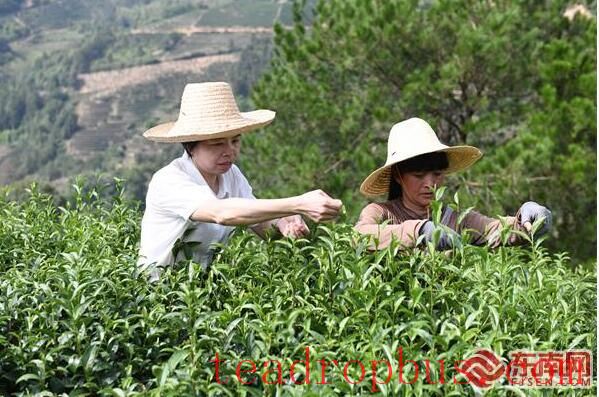“If Tea plants are not pruned in a timely and accurate manner, it can affect the yield and quality of the tea leaves in the following spring. The trimmed branches and leaves can be directly returned to the soil, where they decompose along with organic matter from dead grass. This nourishes the tea garden below through rainwater, helping to retain water, soil, and nutrients.” On the morning of August 7th, in a tea garden located in Bamin Town, Youxi County, Sanming, sunlight shone upon the tea plants as each branch and bud stretched upward vigorously. Lin Xiujuan, a senior tea-making engineer and national first-class tea evaluator, was carefully guiding farmers in pruning the branches and leaves.

Photo by Wu Depeng: Lin Xiujuan's ecological tea garden.
Lin Xiujuan started making tea in 1999 and is the chairman of Shenxi Tea Specialized Cooperative in Youxi County. She is also a representative inheritor of the fourth batch of intangible cultural heritage projects in Sanming City, specifically the “Youxi Green Tea Making Skills.” The Fujian Heart series of teas she produces has become a high-end organic tea specialty and has won numerous awards at provincial, municipal, and county tea evaluation meetings, including the titles of Tea King, Gold, Silver, and Quality Tea Awards.
“Only by respecting and adapting to nature, achieving harmony between humans and nature, can we create truly valuable products. Therefore, the secret to producing high-quality tea lies in building an ecological tea garden with strong natural regulation capabilities. Ecological tea gardens pay more attention to ecological balance in soil management and vegetation protection. Only when tea plants grow naturally in the best environment can they produce natural, organic, and high-quality tea leaves.” Lin Xiujuan explained that many years ago, after repeated comparisons during processing, she found that tea leaves grown in pristine ecological tea gardens had a greener color after processing. After brewing, the tea aroma filled the air, and the taste was sweeter and more mellow. In contrast, tea leaves from ordinary tea gardens heavily fertilized with chemical fertilizers had a darker green color after processing and were not as clear and refreshing in taste.

Lin Xiujuan in the process of making tea.
Youxi County has a forest coverage rate of 78.48%, providing ideal conditions for the development of the tea industry. To put the concept of “lucid waters and lush mountains are invaluable assets” into practice, ensuring the first line of defense in tea production, Youxi County has been actively promoting green ecological tea garden technologies in recent years. It guides the implementation of the “one flower, one grass, one tree” tea garden soil restoration and landscape new model project, strengthens ecological improvement of tea gardens, green prevention and control, efficient mechanized harvesting, and other five new technologies. Additionally, it incorporates tea production into the agricultural product quality and safety traceability system, standardizing the monitoring system for pesticide residues in tea. At the same time, it implements a development model of “leading enterprises + cooperatives + tea gardens + farmers,” unifying planting standards, unified processing, and guiding tea companies and farmers in upgrading their clean processing equipment to achieve standardized, standardized, clean, and ecological production and processing.
Under the guidance of the concept of developing green ecological tea gardens, Lin Xiujuan strictly follows the laws of nature in promoting and implementing modern ecological tea garden construction. She uses management methods such as applying organic fertilizers and biological control techniques, effectively increasing the nutrient content of the tea garden and further enhancing the quality and yield of the tea leaves. During this period, she actively leads tea farmers in picking tea leaves and trimming branches according to seasonal farming schedules, using green manure crops like crimson clover and rapeseed instead of traditional fertilization. She allows natural predators to consume pests, forming a food chain within the tea garden, effectively reducing the occurrence of tea plant diseases and pests. To protect the genetic resources of tea plants, she took on the responsibility of constructing the Xiantou Mountain Immortal Tea Reserve Project in Jitou Village, Bamin Town, successively carrying out road and ditch repairs, cuttings, transplanting, expansion, and other protective constructions. In addition, as a provincial science and technology commissioner, she adopts an organic management approach that follows ecological balance, leading 16 tea farmers in planting 180 mu of high-quality Meizhan tea gardens.

Lin Xiujuan instructs tea farmers in picking single buds.
“After learning ecological planting techniques, my Spring Tea not only sprouts robustly, has good color, and a strong aroma, but I can also increase the yield of single-bud green leaves by about 10 kilograms per mu, selling them at higher prices. Now, I don't need to work outside, and I can earn over 100,000 yuan every year just relying on this tea mountain.” Lin Liubei, a tea farmer who operates over 20 mu of tea mountain in Bamin Town, frankly stated that the comprehensive benefits of ecological tea gardens are high.
Currently, the coverage rate of high-quality tea varieties in Youxi County exceeds 95%, with 100,500 mu of tea gardens and 215 tea enterprises. Approximately 45,000 people are involved in the tea industry. In 2025, the county produced 16,000 tons of dry tea, with a full industrial chain value reaching 1.8 billion yuan.